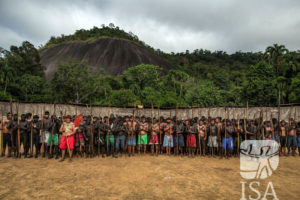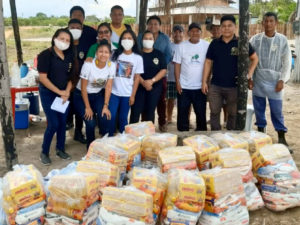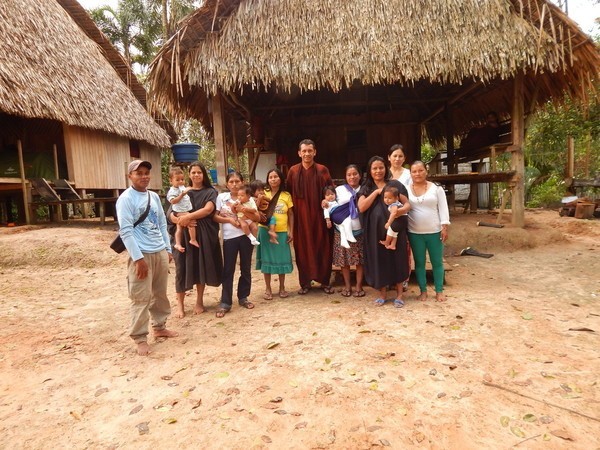After 10 Years of Struggle, Ashéninka Community of Alto Tamayo-Saweto Gains Title to Ancestral Land
August 19, 2015 was a historic day for the Ashéninka people of Peru. After a decade of fighting, the community of Alto Tamaya-Saweto has acquired the title to its ancestral lands.
The community of Alto Tamaya-Saweto has been in the international spotlight since September of 2014, when illegal loggers killed Chota and three other Ashéninka leaders. For over ten years, Edwin Chota led the community’s fight against illegal logging and other threats to the Amazon rainforest.
Almost one year after the murder spree, the Peruvian State granted the Saweto people the title to almost 200,000 acres of their ancestral land. While elated at the news of the title, Diana Rios, the community’s treasurer and spokesperson, insists that this success must only be seen as the beginning. “They thought they could treat us badly forever. But no! We are human beings! We don’t want more bloodshed… We ask the State to support us and to support other communities, too. It’s not just Saweto—there are other communities that don’t have titles.”
Saweto’s long fight illustrates just how difficult it is for indigenous communities in Peru to have their land rights recognized by the state. The community initiated the process more than 10 years ago, at which time they realized that—because no one from the Peruvian State had ever been to their village to register their births or to give them IDs—they, officially, did not exist. This meant that they could not ask to have the rights to their ancestral lands recognized.
The community undertook the long, difficult process of registering all of its members. For years, they ferried their people along the four-day boat trip to the regional capitol, Pucallpa, to fill out yet more paperwork, in order to apply greater pressure to the government. As they approached their goal, they faced increased intimidation from illegal loggers and others who wanted to extract resources from the Ashéninka’s rainforest. The violence came to a head last September when four of Saweto’s leaders—Edwin Chota, Jorge Ríos Pérez, Leoncio Quincima Meléndez, and Francisco Pinedo—were murdered while on their way to consult with a fellow Ashéninka community on the other side of the Peru-Brazil border.
The international attention that these murders garnered, along with the help of Margoth Quispe, a lawyer dedicated to helping the community obtain their title, seemed for a time to be pushing the government to act. However, after being assured they would get the title to their lands quickly, months passed and excuses were made, as the state threw up further bureaucratic roadblocks. The community’s perseverance was key in overcoming these obstacles.
As RFUS program manager Tom Bewick explains, “the titling of Alto Tamaya-Saweto is a victory for the community, which has fought and sacrificed so much to attain it. It is a great success that 200,000 acres have been titled, thereby recognizing all of Saweto’s ancestral land. We hope this action will push the State to recognize the land rights of all indigenous communities in Peru. According to [the Interethnic Association for the Development of the Peruvian Rainforest (AIDESEP)], there are more than 1,600 communities whose titles have yet to be recognized.”
Peru’s indigenous communities face many obstacles when seeking recognition of their ancestral lands: the State’s demonstrated lack of interest in legalizing indigenous territories; the Peruvian State’s lack of action against deforestation, leading to impunity for environmental crimes and crimes against indigenous peoples; among others. The murders of Edwin Chota and other Asheninka leaders are a perfect example of this. There has been virtually no progress in bringing the murderers to justice, and the community of Saweto continues to receive death threats and live in fear of violence by illegal loggers.
Despite this, the community is energized to continue shaping its future and protect its forest. Ergilia Rengifo, Saweto’s leader notes, “Now, we can finally focus on plans we have had for years. We need to train the youth in our community … and continue to make our vision for our community a reality.”
Read More

Murder of Two Yanomami by Illegal Miners Heightens Fears of Renewed Cycle of Violence in the Brazilian Amazon
The murders reinforce the need for the Brazilian government to immediately expel the more than 20,000 miners illegally operating on Yanomami land.

Miners Out, COVID-19 Out: The Yanomami and Ye’Kwana People of the Brazilian Amazon Launch a Global Campaign to Expel Miners From Their Territory
Indigenous leaders demand the urgent removal of 20,000 illegal gold miners from their lands to prevent the spread of COVID-19

Voices from the Ground: COVID-19 Response in Roraima, Brazil
An interview with the Legal Advisor for the Indigenous Council of Roraima about adressing COVID-19 in his territory.
Support Our Work
Rainforest Foundation US is tackling the major challenges of our day: deforestation, the climate crisis, and human rights violations. Your donation moves us one step closer to creating a more sustainable and just future.


